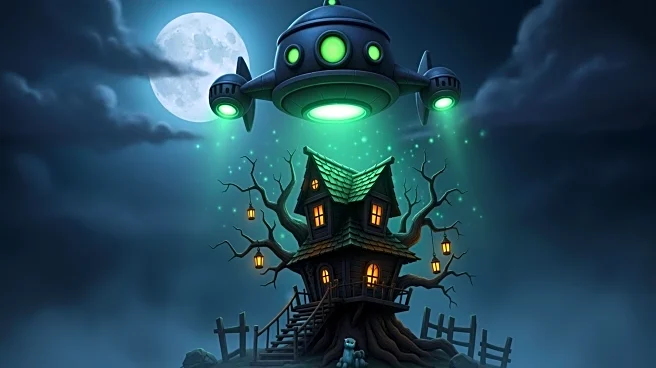What's Happening?
The iconic 'Treehouse of Horror' episodes of 'The Simpsons' have been a staple of the series for over 30 years, introducing audiences to the alien characters Kang and Kodos. These extraterrestrial figures
have appeared in every Halloween special since their debut on October 25, 1990. Known for their drooling mouths and humorous attempts at world domination, Kang and Kodos have become beloved characters in the series. Their antics often parody classic sci-fi tropes, such as alien invasions and intergalactic politics, while also providing social commentary through their interactions with the residents of Springfield.
Why It's Important?
Kang and Kodos' presence in 'The Simpsons' highlights the show's ability to blend humor with cultural critique. Their recurring roles serve as a vehicle for satire, poking fun at human fears of the unknown and the absurdity of political and social systems. The characters' longevity and popularity underscore the enduring appeal of 'The Simpsons' as a cultural touchstone that reflects and critiques societal norms. By incorporating these aliens into its narrative, the show continues to engage audiences with its unique blend of comedy and commentary, maintaining its relevance in the ever-evolving landscape of television.
What's Next?
As 'The Simpsons' continues to produce new episodes, Kang and Kodos are likely to remain integral to the 'Treehouse of Horror' specials. Their roles may evolve to address contemporary issues, reflecting the show's ongoing commitment to satire. Fans can expect these characters to continue providing humorous insights into human nature and societal trends, ensuring their place in the series' legacy. Additionally, with the show's history of predicting future events, Kang and Kodos may serve as a platform for exploring new sci-fi themes and technological advancements.
Beyond the Headlines
The inclusion of Kang and Kodos in 'The Simpsons' also raises questions about the portrayal of aliens in media and the cultural fascination with extraterrestrial life. Their gender ambiguity and humorous depiction challenge traditional representations of aliens, offering a more nuanced perspective on identity and otherness. This approach not only entertains but also encourages viewers to reconsider preconceived notions about difference and acceptance, highlighting the show's role in fostering cultural dialogue.










